“I just hope they don’t get us all distracted on that global warming thing, because we’ve got some serious concerns about the coal export terminal.”
This comment was offered by someone I had not met before, as we walked out of a workshop that was focused on the proposed Gateway Pacific coal export terminal (GPT) here in Whatcom County, Washington.
Surprised and not quite sure what to make of it, I offered that Greenhouse Gas emissions were one of several legitimate concerns that may be in the scope of the Environmental Impact Statement (EIS) for the proposed project.
Again and again I heard this in various versions. “We’d like you to come and talk to our neighborhood association, about impacts like blocked train crossings that are specific to our area.”
It seeped into the presentation materials. A picture of the Earth from space, titled “Our Back Yard”, was replaced by a map showing the 121 towns along the rail transit route that would be impacted by the huge numbers of mile-long coal trains. The thematic “Carbon Pollution” slide was excised to save time, during an occurrence of the periodic trimming that’s required to keep the PowerPoint kudzu under control.

Limits to our horizons?
I re-listened to a
radio interview where Nicole Brown and I had been invited to talk about EIS Scoping for the project. Somehow, I had not mentioned global warming or GHG. Not once! This, about a project whose core purpose is to load 48 million tons per year of coal for shipment to China, with the inevitable consequence that the coal will be lit on fire and turned into mostly CO2 (plus some cheap plastic junk that we get back and then owe them more money for). There was, of course, a reason: The EIS process may or may not recognize climate issues, but is certain to consider other issues we cited.
Internal discussions, in person and on the list serves, debated: Should GHG and global warming be front and center, or not? If we let the global warming issue slide down in the batting order, is that pragmatism or is it copping out?
An obvious irony is that global warming issues, with a side order of resource depletion concerns, are the very thing that brought me back to trying to write something meaningful after many years of just earning a living, parenting, and all that good stuff. I started with several broad global warming columns.
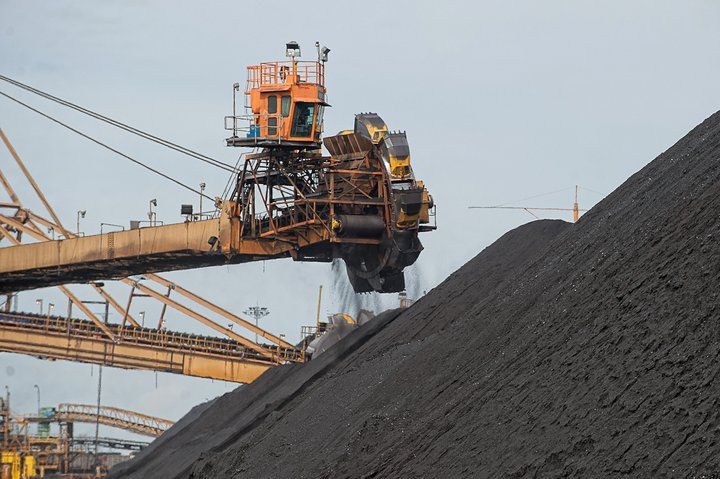
Coming soon to our back yard
Then, it was pointed out to me that a stunning type example, of exactly the issues I cared about, was planned for our home county: North America’s largest coal export terminal. It was only later that I came to better understand the vast collection of local impacts that caused so much concern. For me, it was global warming at the start, and it’s still the heart of the matter.
That’s more than personal background. It’s a data point. There is a certain population of people whose motivation on an issue like this starts with global warming.
Once you start looking, it’s easy to see. One of our local leaders, Matt Petryni of Re-Sources, said this in a recent interview in Sweeney Politics blog:
Q: What is your number one reason for opposing the Cherry Point Terminal?
Matt: For me it is climate change. I see climate change as the defining issue of my generation and it affects so many people in so many ways, as we are seeing this summer. Stopping this coal terminal keeps 5.7 gigatons of CO2 out of our atmosphere.
Conversations with other active members of the community confirm it: Climate change is either at the top of the list of motivations, or near it. Many of our most active concerned citizens are driven in substantial part by climate concerns – not in conflict with or instead of local impacts, but as part of the same overall phenomenon.
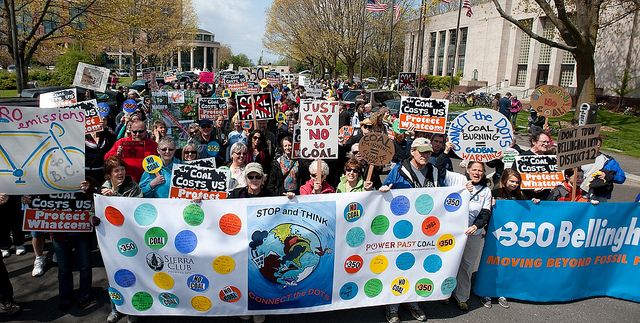
Motivated for our climate
What I get from those observations is this: Our ability to protect ourselves from schemes like the coal port is substantially driven by concerns about climate change. To organize and motivate the people who are most likely to really work on the issue, there’s no doubt that it’s critically important. A climate connection motivates and activates the very people who are most likely to do our community the most good.
But what about the question of messaging to the broader population?
Perhaps the clearest voice in our region on this topic is from KC Golden, policy director at Climate Solutions. No ambiguity here:
Have climate campaigners learned the art of political communication too well? We poll and focus group. We segment audiences and target swings. We “go to people where they’re at” – activating live communication frames and salient issues. We move the dial. There is tactical merit in all this…
But climate change is not a “message.” It’s an objective reality and an urgent crisis. Deception about it will surely go down as history’s most egregious lie. Avoiding or hedging this reality isn’t as bad as denying it, but it reinforces the larger ecosystem of denial. It’s tough to imagine how we begin to turn the tide until we stand tall – with both feet, whole hearts, and strong, explicit words – on the side of the truth.
[Emphasis added]
On the side of truth: Powerful stuff.
And I think it resolves the question. The truth won’t hurt us.
Ultimately, the most important thing we've got going for us (other than, you know, the facts) is authenticity, and the moment we start parsing and pondering our message, we've almost certainly lost that. "Messaging" turns us into politicians with an agenda instead of scientists working together for the truth.
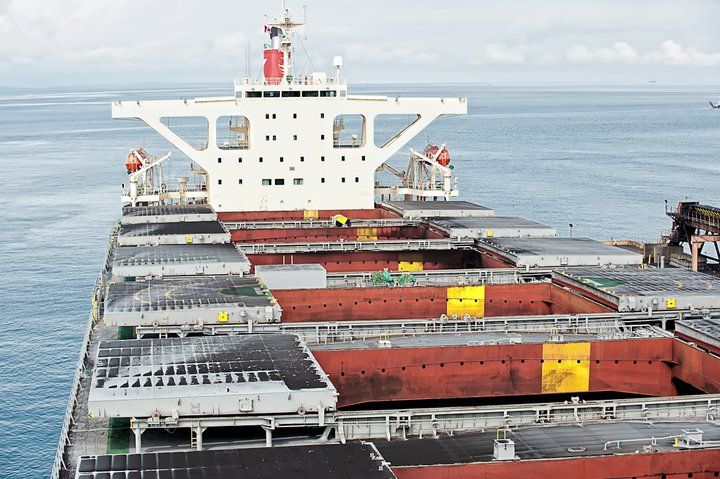
We'll get it all back after a while ...
It also gets me thinking that maybe we’ve posed the question backwards. The question is not whether a climate argument will, by itself, sway an undecided person on a specific issue like the coal terminal. On any given day, maybe it will, maybe it won’t. What’s really at hand is the opportunity to provide education about the entire picture – the inseparable link between all of the forms of carbon pollution.
Just as there often is no daylight visible on a summer afternoon in Beijing, there is no daylight between all types and locations where carbon pollution occurs in a big carbon project.
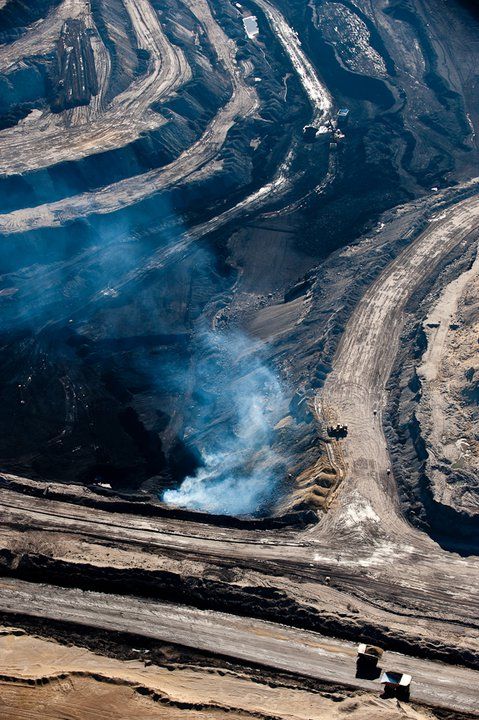
Overdrawn: Nature does not do bailouts
Oil mixing with drinking water. Synthetic hydrocarbons that have no business even existing. Coal any place other than in the ground. Too much carbon dioxide in our atmosphere. Carbonic acid destroying the health of our oceans and coastal waters.
When those who want to further expand the combustapalooza propose something that is so egregiously out of balance with human scale and values, such as sending a trillion pounds of rocks to China so they can be lit on fire, it’s our chance to clearly link that kind of scheme to both the myriad local effects and inseparably to climate change. We can make it cling to their necks like a pair of Tiberian bats.
We can clearly show that pollutocrats are willing to harm our communities, in various ways that are local and very easy to see, for their profit. From there, the heart of the climate issue is laid bare: the conflict is not between climate and our prosperity. The conflict is between a livable climate and their profit.
It’s exactly the right time to re-commit to the truth that climate is a pillar of the education we need to provide to our communities about big carbon. It is not something to back down on, or shunt aside. Of course, at a given moment, we can and should discuss any of the very large number of other concerns about big carbon projects. When operating in a regulatory framework such as EIS scoping, we must include a very strong effort on all of the effects that may be recognized by the permitting process. But let us never lose sight of the fact that, no matter what color or type of hat the elephant wears to disguise itself with, it’s all the same elephant.
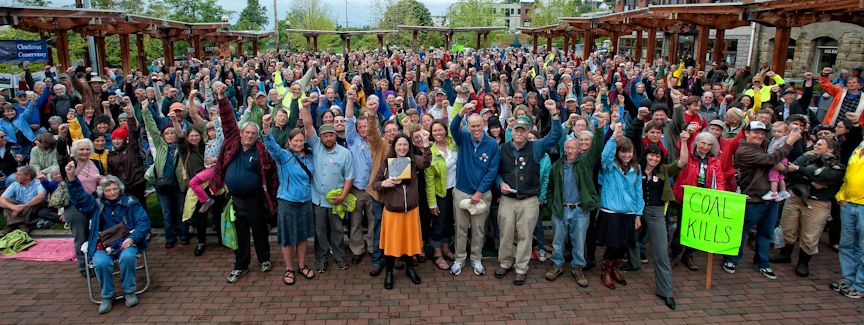
Inspiration - Bill McKibben and 800+ friends in Bellingham in May 2011
It's a privilege to get to contribute to this excellent event. Many thanks and kudos to Bill McKibben, Boatsie, and Patriot Daily for making it happen.
Thanks for photo contributions from Paul Anderson, and review comments from Paul, from Nicole Brown, and from Matt Petryni.
And most of all, to everyone who is protecting our habitat, one issue at a time, one place at a time, every day, including or especially the awesome leaders and teachers here in Whatcom County, Washington.
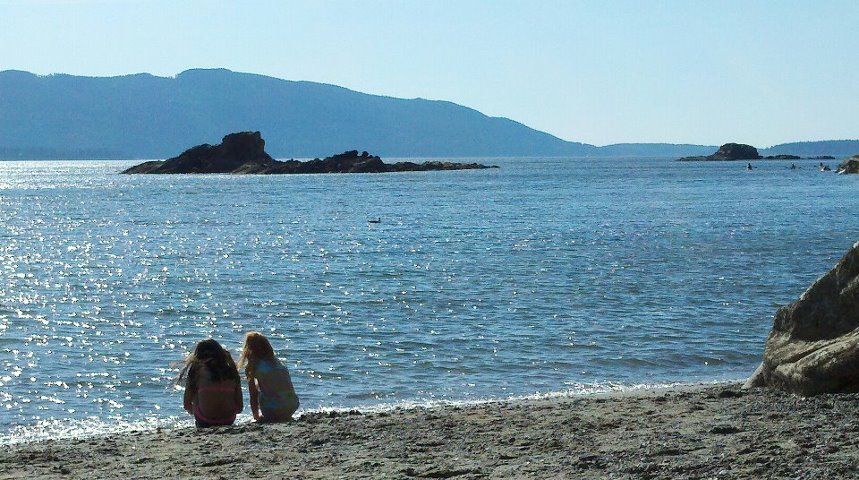
Our Future - Worth Saving
"Nature does not do bailouts" in caption - Quote from Jonathan Lash in this column by Al Gore
Coal Train Facts
Info about EIS Scoping From Protect Whatcom
Re-Sources
CommunityWise Bellingham - economic info
Coal Free Bellingham
Getting a Grip on Climate Solutions
Climate Solutions


